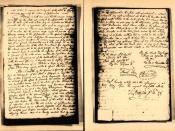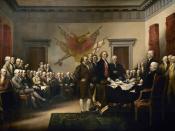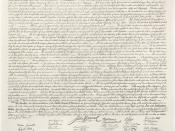The American Revolution was and will always be the most important piece of history for the United States of America. It was revolutionary. We The People broke free from Britain and gained our independence. But the question is, how much was gained? Did we lose more that we gained? Were the consequences larger than the positive aspects? Only one third of the colonists enthusiastically supported the Revolution. While I am happy to be an American, and will always support decisions made my founding fathers, I can't help but being a little reticent to slapping them on the backs and congratulating them for being masters of the world.
From 1763, Colonists had only to be convinced that an arbitrary ruler-whether Parliament or King-was violating their inherent rights, to feel that rebellion was justified. The colonists were unhappy and being treated shabbily by their motherland, trouble was brewing. This conviction was bred in them by the series of events that occurred between 1763 and 1776.
The language used to protest the British Acts was legal, and political. But the primary cause of the Revolution was economics.
In theory the colonists accepted and firmly believed the principle that natural laws rather than royal decrees should govern the economy. In practice only the southern colonies were bound to England by the tobacco trade. The New England and Middle Colonies, unable to find markets in Britain, found their own prosperity by trading outside the empire. Any attempt to stop this trade would lead to rebellion and consequentially ensued. England's demands that all trade must go through them made restrictions upon economic prosperity of the New England colony. This did not go over well with the colonists.
The major cause for revolution dealing with the economic situation is of economic subordination of colonies to England.



Men in Wigs
This is a good essay on the causes of the American Revolution. I agree that economics was a leading cause of the Revolutionary War and so too was the desire for liberty. It's hard to say which was more important and at this point it is largely an academic exercise to speculate.
Lest we forget that there were plenty of men in wigs in England who were all too willing to tax the American colonists as much as they could get away with, much of the blame for the American Revolution lies with an insensitive policy toward the colonies by King George III. Had a more reasonable man sat on the throne in 1775, war might have been averted. Great job!
10 out of 10 people found this comment useful.